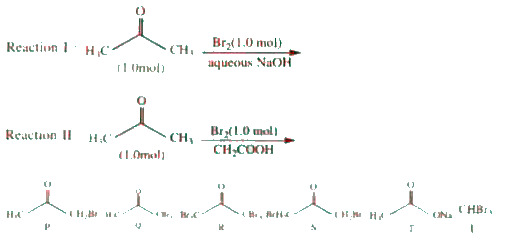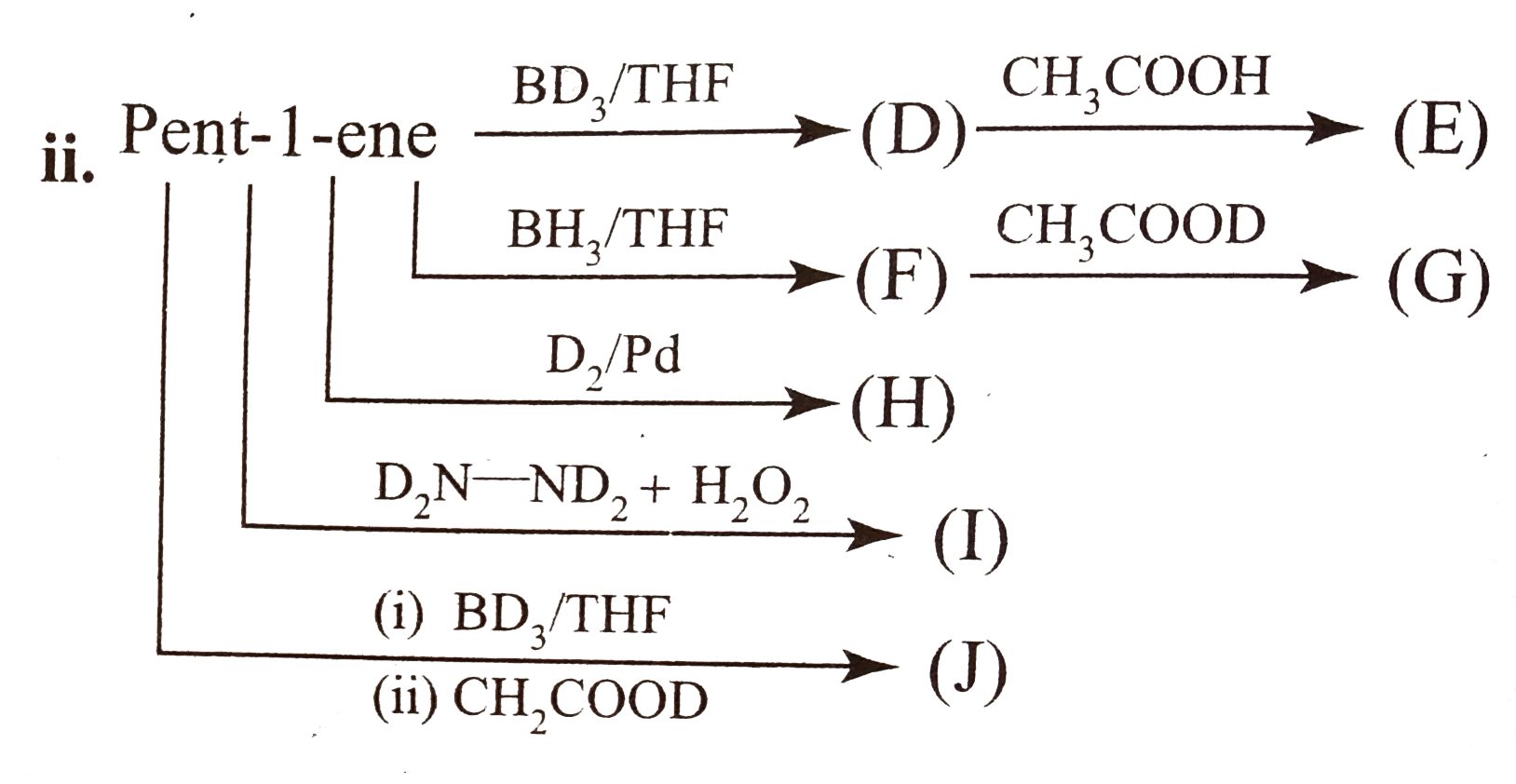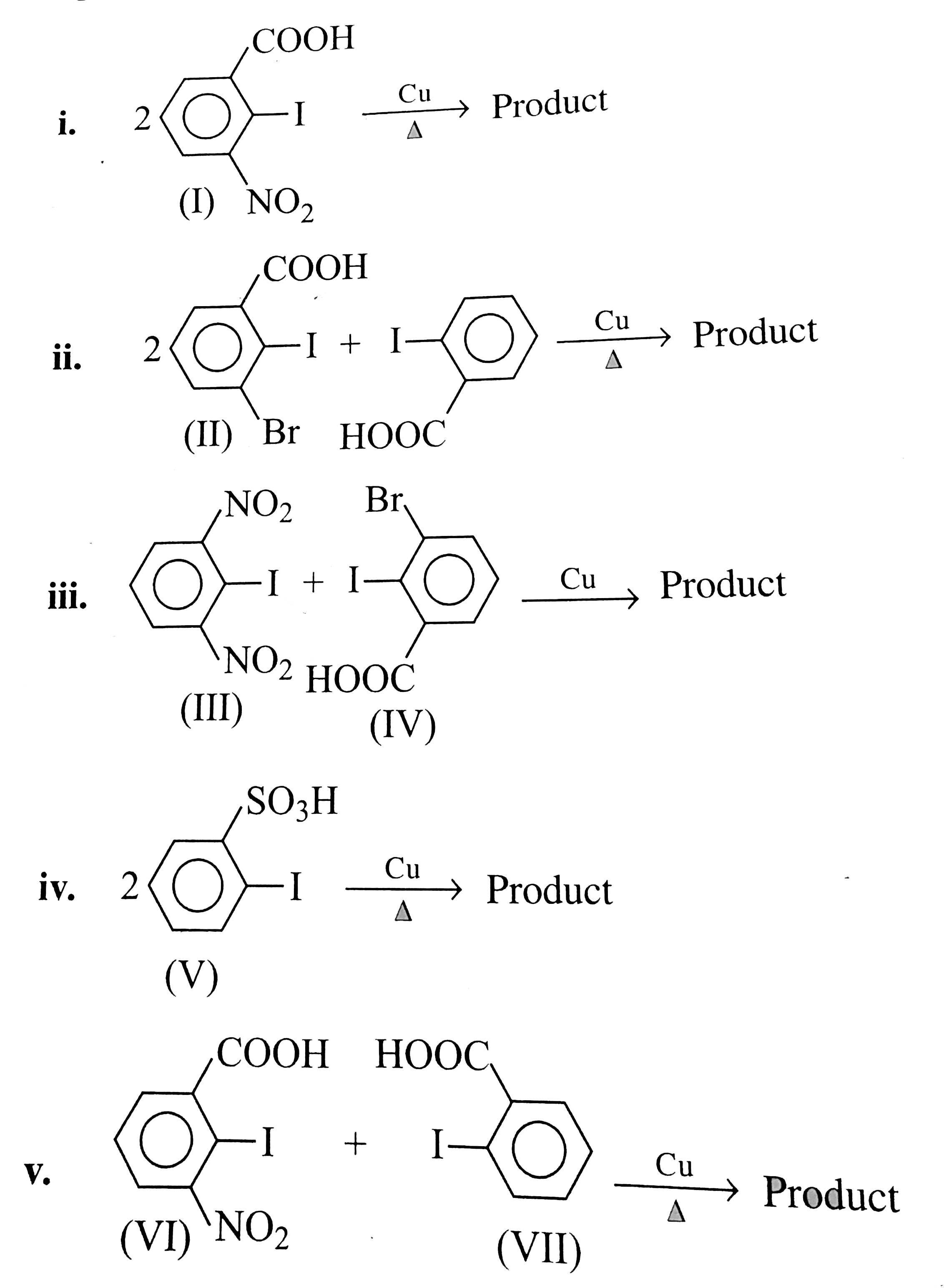After completion of the reactions (I and II), the organic compound(s) in the reaction mixture is(are)
 Solution in Telugu
Solution in Telugu
Reaction I : P and Reacation II :P
Reaction I : U, acetone and Reaction II : Q, acetone
Reaction I:T, U acetone and Reaction II : P
Reaction I: R acetone and Reaction II : S, acetone
The correct Answer is:C
H3C=O∣∣C−CH3Br2−−−→NaOH(CHBr3)+CH3−O∣∣C−Ona,CH3−O∣∣C−CH33Br2−O∣∣C−CH3+3HBrBromoform
CBr3−↑O∣∣HOH−→c−Br3+CH3−O∣∣C−OH,CH3−O∣∣C−OH+C−Br3→CHBr3+CH3−O∣∣C−O−Na+

Topper's Solved these Questions
- ALDEHYDES AND KETONESBOOK - AAKASH SERIESCHAPTER - ALDEHYDES AND KETONESEXERCISE - LEVEL-II LECTURE SHEET (EXERCISE-II)
28 Videos
- ALDEHYDES AND KETONESBOOK - AAKASH SERIESCHAPTER - ALDEHYDES AND KETONESEXERCISE - LEVEL-II LECTURE SHEET (EXERCISE-III)
11 Videos
- ALDEHYDES AND KETONESBOOK - AAKASH SERIESCHAPTER - ALDEHYDES AND KETONESEXERCISE - LEVEL-I(EXERCISE-II)
59 Videos
- ALCOHOLS, PHENOLS AND ETHERSBOOK - AAKASH SERIESCHAPTER - ALCOHOLS, PHENOLS AND ETHERSEXERCISE - ETHERS (OBJECTIVE EXERCISE-4)
50 Videos
- ALKYL AND ARYL HALIDESBOOK - AAKASH SERIESCHAPTER - ALKYL AND ARYL HALIDESEXERCISE - OBJECTIVE EXERCISE - 4 (ASSERTION (A) & REASON (R) TYPE QUESTIONS)
19 Videos
Similar Questions
Which of the following give N- subtituted amide from ketoxime ?
View SolutionAldehydes and ketons are susceptible to nuclephlic addition because carbonylgroup

Polar (due to electronegativeity difference between carbon and oxygen
positive charge on carbonyl compound towards nucleophilic . this addition is catalysed by acid . REactivity of carbonyl compound towards nuclephilic addotion increase with increase in teh electron deficiency at carbonyl carbon Thus (-I.E ) groups increase while (+I.E ) groups decreases the reactivity of carbonyl compound .
which among the following is most reactive towards nuclephilic addition
View SolutionEthylene is converted to X on passing through a mixture of an acidified aqueous solution of palladium chloride and cupric chloride. Which of the following reagents readily take part in addition reaction with X ?
View Solution(A): Alcoholic fermentation involves conversion of sugar into ethanol by the action of yeast.
(R): Fermentation involves the liberation of CO2 gas.
View Solution(A) Towards SN2 reaction, order of reactivity is CH3Br>CH3CH2Br>(CH3)2CHBr>(CH3)3CBr.
(R) Greater the stability of carbocation, greater will be its ease of formation from alkyl halide and faster will be the rate of SN1 reaction.
View SolutionComplete the following reaction: i. ii.
View SolutionComplete the following reactions :
i.
ii.
View SolutionComplete the following reactions :
i.
ii.
View SolutionAfter completion of the reactions (I and II) , the organic compounds (s) in the reaction mixtures is :
View SolutionAfter completion of the reactions (I and II) , the organic compound (s) in the reaction is //are
View SolutionAfter completion of the reaction (I and II), the orgnanic compound(s) in the reaction mixtures is(are)
View SolutionAfter completion of the reactions (I and II ), the organic compound (s) in the reactions mixtures is (are )
View SolutionAfter completion of the reactions (I and II) , the organic compound(s) in the reaction mixtures is(are)
View Solution
The compound(s) in the reaction (i) is/are:
View SolutionThe compound (s) in the reaction (ii) is/are:
View Solution
